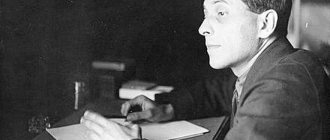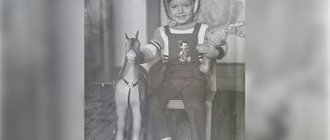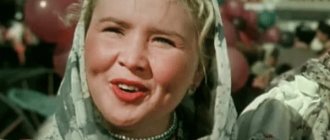She burst into the Moscow elite as quickly as a meteor, and just as quickly and suddenly disappeared. It flashed by, leaving behind rumors and gossip, and disappeared as soon as it saw fit, becoming completely inaccessible to the cunning radars of the secular press.
She always did this: she made decisions abruptly and irrevocably, without particularly caring about what opinion others would have. That's what she does now. Of course, she cares about the opinions of her loved ones. But, by and large, in her words, Marina Kuzmina knows what society is and “what the ticket price is.”
Malakhov: “My favorite blondes”
In the first half of the 2000s, only the lazy did not take part in the discussion of the high-profile romance of two “stars” - multimillionaire Marina Kuzmina and popular TV presenter Andrei Malakhov.
The history of the relationship between this bright couple was legendary. Later, when the wounds had healed, the former lover suddenly abandoned by the diva outlined his interpretation of their connection in a new book.
"I couldn't buy it"
Kuzmina Marina showered the famous showman with gifts of fabulous prices, arranged romantic holidays in different parts of the world, and opened up a world of luxury and wealth for her beloved. He willingly responded with nice gifts, tolerated her eccentric quirks and... was burdened by life “at someone else’s expense.”
The affair ended quickly, like everything she did. Kuzmina Marina crossed out her young lover from her life, and threw their common photographs out of the car window onto the road...
The famous presenter explained their breakup by saying that the woman “couldn’t buy him”...
The heroine of the program
Buryak is another wealthy blonde from Malakhov’s list. At the time of the alleged affair with Andrei, she was married to businessman Dmitry Buryak and raised three children. The affair with the TV presenter ended as quickly as it began, but the former lovers managed to maintain friendly relations, and Margarita returned to the family. When a few years later it turned out that Dmitry had another woman and children in Ukraine, a scandalous trial began - the husband literally kicked Margarita out the door, refusing alimony. The woman came to the “Let Them Talk” program, which was hosted by Andrei at that time, to fight for money.
Who was useful to whom?
Idle gossips do not ignore the rich and famous. The couple was often asked uncomfortable questions about how many years Kuzmina Marina is older than her lover, is she really that rich, why did the breakup happen and how did they both survive it, and who, in the end, really turned out to be useful to whom?
Andrei answered questions from the press with the dignity of a diplomat: evasively about his former beloved, sincerely about himself. For him, the breakup was painful. He took Marina very seriously and was determined to spend the rest of his life with her.
Marina commented on their breakup and, at the same time, her sudden refusal to go public seven years later, in 2014. She remembers Andrey with great warmth; he was a truly close person to her. If she had a different character, Marina believes, everything could have turned out differently. And by that time she was simply “sick of” social life.
Someone calls their then romance an agreement on “joint promotion”, according to which the “lovers” mutually benefited from each other: she showed him the world, he “let” her into the pages of gossip columns.
You cannot ban other people’s guesses and fictions, just as you cannot ban the existence of history. For Marina Kuzmina, all this has long been “overgrown with reality.”
She now has a new life, a new home, new problems and interests. And only Marina herself remained the same. Almost…
Personal life
While Elena Korikova’s creative biography was filled with bright roles, passions were in full swing in her personal life. Elena had several novels and one official marriage.
Elena Korikova had her first serious romance as a student with classmate Dmitry Roshchin, the son of playwright Mikhail Roshchin and actress Ekaterina Vasilyeva. Charming Dima fell in love with a young beauty, but his wayward mother was categorically against this relationship. Family relatives say this may have been the reason for the rift in their relationship.
When Lena realized that she was pregnant, they no longer met with Dima, but she still informed him. Roshchin said that he does not believe in his paternity and does not recognize the child. Elena gave birth to her son herself and never regretted it once in her life.
Elena's first husband was playwright and writer Dmitry Lipskerov. They met at a party and dated briefly. As soon as Dima proposed to Lena, she immediately agreed.
Elena Korikova and Dmitry Lipskerov
The marriage was happy, but short. Dmitry did not accept the fact that Elena often turned to her mother for advice. But he loved her little son Arseny very much and even wanted to adopt her, but Korikova was against it.
The actress’s second marriage was civil; for about ten years she lived with video clip director and cameraman Maxim Osadchiy. There were many scandals and disagreements in their relationship; more than once Lena packed her bags and left Maxim. He waited patiently, after a while Elena returned, but the relationship had exhausted itself.
Lena said that Osadchy is too devoted to work and is not ready for family life. He, in turn, said that Korikova was no longer the same girl with whom he once fell in love.
During the filming of the series “Poor Nastya,” the press quickly attributed Elena an affair with Daniil Strakhov, who played her beloved Baron Korf in the story. Journalists saw the reason for this in the fact that during the Moscow filming the actors spent the night in a hotel. Both actors denied these rumors; they spent almost days on the set; there was simply no time to travel home.
Elena Korikova and Daniil Strakhov in “Poor Nastya”
After working in the “Poor Nastya” project, Korikova broke up with Maxim Osadchiy. TV presenter and showman Andrei Malakhov tried to take a place in her heart. However, their relationship never became official.
Elena Korikova and Andrey Malakhov
Later, the famous tennis player Marat Safin began to court Korikova. He tried to be close to the woman he loved everywhere, jealously followed her professional activities and even bought an engagement ring. Unexpectedly, the relationship between the couple went wrong; Marat’s friends suggest several reasons for the breakup, one of which is considered to be Marat’s constant jealousy.
Elena Korikova and Marat Safin
For two years, Lena dated and went out with actor Sergei Astakhov. The couple was beautiful, but their romance was short-lived. Sergei left Korikova for another woman.
Korikova got married very early and her first husband was playwright Dmitry Liksperov. But the marriage did not work out, and the couple quickly separated.
And soon Korikova began to have a new romance with the handsome Dmitry Roshchin. Who knows why, his mother, actress Ekaterina Vasilyeva, was categorically against this union and when Korikova became pregnant, she did everything to prevent the wedding from taking place.
With Dmitry Roshchin
Roshchin became a clergyman, Korikova gave birth to a son and married cameraman Maxim Osadchy, who replaced the child’s father. Soon the couple had a daughter together.
According to rumors, the marriage broke up due to Korikova’s affair with Marat Safin, which surfaced after the “Circus with the Stars” project.
With Marat Safin
Later, among the actress’s hobbies were Andrei Malakhov and Sergei Astakhov. Who she is in a close relationship with is currently not disclosed.
Elena Korikova was officially married only once. The first husband's name was Dmitry Lipskerov, he is a writer. However, the marriage was short-lived. It is not known what caused the divorce - the difference in age (Dmitry is several years older than Elena) or in outlook on life. Some people close to the couple claim that quarrels and everyday problems are to blame
But even before the divorce, Korikova’s personal life was full of novels. One of them attracted the attention of the entire acting world of Russia. In the 90s, the actress met the son of her colleague Ekaterina Vasilyeva, Dmitry Roshchin. The couple was very beautiful. Having learned about his beloved’s pregnancy, Roshchin started talking about the wedding. However, Vasilyeva did everything to ensure that her son broke up with Korikova. Son Arseny was born after the separation, which prompted Roshchin not to acknowledge paternity. Later he was ordained a priest and got married.
But even children born in an official marriage did not force the man to recognize Arseny.
Korikova’s third beloved cameraman, director Maxim Osadchiy, was involved in raising Arseny. In 1998, they all left for America together. Here the actress became the face of the Jacques Dessange fashion house. A few years later the couple returns to Russia. The civil marriage of Korikova and Osadchy lasted 10 years.
The actress repeatedly left her husband, then returned. But, despite all attempts, the family could not be saved. Maybe the reason was that the couple did not have children together.
Some associate the separation of Korikova and Osadchy with the start of filming of the actress in “Poor Nastya” and the surge in popularity. Others say that the reason was a whirlwind romance with co-star Daniil Strakhov. However, the actors themselves denied any connection with each other.
Later, one could observe Korikova’s romance with the famous presenter Andrei Malakhov. As it seemed to fans of the artist, Malakhov was too picturesque, although he beautifully looked after his beloved. Quite quickly the couple broke up.
There are rumors that Korikova had an affair with tennis player Marat Safin. They were also fueled by the actress herself, who repeatedly stated that she had met the one she had dreamed of all her life. But, despite this, the romance ended in separation.
Further, Korikova’s personal life was filled with love for Sergei Astakhov. The actors were together for about two years, but still broke up. Afterwards, Korikova was often noticed in the company of producer and director Sergei Chernykh.
Businesswoman
Then, in the mid-2000s, her breathtaking outfits, her daring, truly Russian, nightly sprees in the company of people like her, unattainable and incomprehensible for the common man, the rich and famous, her scandalous relationship with the “most popular” TV presenter , which ended so pitifully - all this, thanks to the press, was made available to the general public.
But few people knew that the morning after the noisy party, while the other participants in the fun were sleeping off and coming to their senses, Marina was throwing off the guise of a “bacchante” and turning into a real businesswoman. Collected and smart, in a business suit, with a strict hairstyle, at nine she was already holding regular negotiations.
About attitude to work
They speculated about her, they wrote that she created her very masculine and very successful business thanks to a rich inheritance either from her husband or from her former lover, a Colombian drug lord.
She herself calls business games for adult children, which should not be divided into games “for girls” and “for boys.”
As she has repeatedly admitted to journalists, she personally really likes what she does. Moreover, it is not a matter of the material component. She enjoys the process itself. And she really likes herself in this process.
She knows of no examples where a truly successful business was created solely on calculation. Real success comes when a person loves his work and gives himself completely to it.
Childhood and family of Olga Kuzmina
Olya was born in Moscow.
The parents took their daughter to a choreography class, to the acrobatics section. Olga studied folk dancing. At the age of eleven, she was able to enter the folk dance school-studio of Igor Moiseev. A year later, the girl was accepted into “School Years” - a folk dance ensemble. Everything in her life was connected with music and dancing, even the school where Kuzmina studied had an in-depth study of choreography and music.
As Olya recalls, she was paid five hundred rubles for filming a story in Yeralash, but this was far from the first money she earned during her school years. She also received payment for dance performances. The actress remembers that once she earned fifty dollars, she and her mother went to Children's World, where they purchased a Lego set.
The star of the TV series “Kitchen” Olga Kuzmina has now become a popular actress
After she starred in several episodes of Yeralash, she seriously thought about becoming an actress. She did not immediately manage to enter a theater university. She failed, so she decided to become a student at the Academy of Slavic Culture, graduating in absentia from the Faculty of Cultural Studies.
A year later, Olya nevertheless entered VATI-GITIS, where she studied in Prokhanova’s class. Her graduation performance was “Ghoul. Dreams of an Ironic Man” by A.K. Tolstoy, in which she played Dasha.
"The Iron Lady"
Marina Kuzmina's business is related to heavy and non-ferrous metallurgy. She is the president of the company, which has been extracting metallurgical raw materials in India, Brazil, Gabon, and South Africa for many years and supplies it to enterprises in the CIS countries and Eastern Europe. From there, finished products (cast iron, ferroalloys, etc.) are exported to Japan, Malaysia, Indonesia, South Korea, and China.
The company supplies mainly iron and chrome ore, coke, and metallurgical bauxite. But its strategic direction is African manganese ore. Ashley Limited is the world's second largest importer of manganese ore.
"I work with metal"
There are indeed few women leaders in her industry. Despite her former secular eccentricity, in a business where non-public metallurgists manage multibillion-dollar affairs, she has a reputation as an unbending, absolutely reliable partner.
She is proud of the respect she commands from these “strong businessmen and good men.”
Of course, at one time, because of her wayward eccentricities, in the light of her colleagues she was looked at as a black sheep. But over time they came to terms, realizing that in reality she was a stone wall.
Like many who were burned during the default in 1998 and lost confidence in the stability of the domestic economy, her capital is concentrated in the accounts of foreign banks.
She had the opportunity to fly on business trips to countries in Latin America, Asia, and Africa. She visited Korea, China, Japan, and discovered new, completely “dead” corners: in one of the Indian states she met people who do not eat meat or drink alcohol, and do not know what electricity is. Men crush the rock there by hand, using huge hammers, and women collect the ore in baskets and carry it on their heads into dump trucks.
She had to live in places where, in conditions of incredible heat, they were given three bottles of water per day, which you could either drink, or wash with, or wash with and then drink...
According to Marina, she has more flight hours than some flight attendants - on average, 1-2 business trips per week. Because of her daughter, who is already sixteen, Marina tries to reduce her trips to a minimum. Her top managers can always replace her if necessary. But she tries to get into everything personally. Marina does not believe in business that is run by managers. You need to know business thoroughly and do it yourself.
Personal life of Olga Kuzmina
Kuzmina, while a student at the Academy of Slavic Culture, met and immediately fell in love with her future husband.
As the actress herself says, it was love at first sight, her first true and only love. The young people met for a long time. The wedding took place in 2010. They celebrated it in Bali. Olya remembers that the day before she bought a light cotton long dress at the local market. It became her wedding day. The wedding ceremony took place right on the beach in the presence of only a few guests.
While filming “Kitchen,” Olga found out that she was pregnant. It was not easy for her, since during toxicosis it was difficult to tolerate the various smells that reigned in the kitchen, where professional chefs helped them during filming.
Olga Kuzmina found out about her pregnancy at work. Today she is raising a son
In early July, the actress gave birth to a son. The couple named him Gordey. During childbirth, her husband was next to her for eighteen hours, holding Olya’s hand. The actress and her husband did not have time to complete renovations in the nursery before giving birth, so she was very worried that when she returned home with the baby, she would find herself in an uncleaned apartment. But to her surprise, she found the house in complete order, her son’s room was ready to welcome a new family member.
She plans to start acting again soon. She believes that giving birth to children is a woman’s destiny and does not think that this can unsettle her and interfere with her career. Filming for the third season of “Kitchen” will soon begin, where she will play again.
The actress’s husband works in the riot police as a senior psychologist. As Kuzmina says, he never brings work home and does not “work” with relatives.
Marina Kuzmina: biography. As the Steel Was Tempered?
She was born into a military family and is a philologist by training (diploma of translator from the Moscow Institute of Foreign Languages).
She began her career in the early 90s as a translator at a large Japanese metallurgical company.
According to the rules of Japanese business, as a secretary, she was entitled to a chair without a back or armrests. Marina remembers that sitting on such a chair was very uncomfortable. Probably, the desire to change the seat to a more comfortable one became one of the incentives for her career growth: over time, armrests and a backrest appeared, then she moved to the leather chair of the right hand of the head of the department. It is very difficult for a foreigner, especially a woman, to make a career in Japanese business. She remembers working with the Japanese as a hard, but very good school: she had the opportunity to visit both coal mines and blast furnace shops.
Then events developed rapidly. A great redistribution of property began in the country. “Red directors” were replaced by tough “boys in crimson jackets”, next to whom the Japanese had nothing to do.
In conditions of complete confusion, as the then Russian business seemed to her Japanese leaders, she opened her own transport company. Having enlisted the support of Japanese partners - former teachers and managers, she began importing raw materials to Russia and Ukraine.
Trusting women’s intuition, she did not hope for the “benefits” of domestic privatization, but found her place in overseas business, where she did not have to “hustle” with broad-shouldered “boys in jackets.” She turned out to be more in demand overseas than in her home country.
Heavy metal
The car rushes from Sheremetyevo along the night road. The woman in the back seat, looking like an advertisement for the Dolce & Gabbana winter collection, in a tinny voice orders the phone to unload something important at the only unfrozen port of Odessa. In a house on a fashionable highway near Moscow, a little daughter and a dressing room await her, looking like a dream come true for the daughter of a military man from a town lost on the outskirts of the former empire.
— Marina, please tell us what your company does?
— I am the president of Ashley Limited, which has been mining and supplying raw materials for the metallurgical industry for more than 10 years. A simple business - using ocean-going vessels with a displacement of 20 to 100 thousand tons, deliver raw materials to factories in Ukraine, Romania, Bulgaria and other CIS countries and Eastern Europe and, accordingly, export finished products - ferroalloys, cast iron, etc. - to China, South Korea, Japan , Malaysia, Indonesia. Over the years, we have supplied metallurgical bauxite, coke, iron and chrome ore from India, Brazil, South Africa, and Gabon. But the strategic direction of our business is manganese ore mined in Africa. We are the second largest importer of manganese ore in the world.
— How did it happen that you got into such a “male” business?
— I would not divide business into “women’s” and “men’s”. But in such a closed, club-like and, I would say, elite business, such as the mining and export of manganese ore, there are indeed very few women managers. This is a game for boys, and since childhood I was more interested in playing with boys. In addition, for people of our generation, much of their fate was determined by chance, and not by upbringing and education. I am a philologist by training, but in the early 90s I studied practical business at the representative office of a large Japanese company - in the metallurgical department. I went through all the steps of the Japanese career ladder. By the way, among the Japanese, the signs of career growth are literally obvious - as a secretary, I was entitled to a chair without a back and armrests. Then, as my career grew, armrests appeared, then a backrest, and soon I was already occupying a leather chair and was the right hand of the head of the department. This was truly a great achievement - in the Japanese business structure it is difficult for a foreigner to make a career, especially for a woman. The work of the Japanese was hard, but a very good school. I often traveled to places that are not so attractive to the average person, but very attractive to those who understand: Aktobe, Norilsk, Nikopol, Monchegorsk and so on. The Japanese are meticulous people, so I had to visit with them both coal mines and blast furnace shops, sometimes not without risking my life - except that they put me in an electrolysis bath to calculate the amount of energy consumption and the cost of production.
“Didn’t you want to give it all up and do something more suitable for a young lady?”
“You know, I was a very stubborn young lady. Besides, I didn’t want to sit on a chair without a back and armrests. And I knew that the path to more comfortable pieces of office furniture lay precisely through the blast furnace workshops and the huge sheets of reports that I compiled for the head office in Tokyo. It was not in vain that she compiled it, because she soon knew the technological processes so well that she could quite professionally discuss their subtleties with the managers and technologists of mining and metallurgical enterprises.
— And how did events develop further?
- Rapidly. Great changes were taking place in the country, and above all, the redistribution of property. “Red directors” in former Soviet factories have been replaced by “boys in jackets,” who now make up part of the audience of your magazine. Unlike the management of our company, I quickly realized that next to young and tough boys, nothing would shine for our Japanese comrades. In addition, terrible confusion began: new anti-dumping duties were adopted, “export windows” were closed, and the basic rules of the game changed dramatically. The traditions of Japanese business do not imply a total change in the rules of the game. While my managers were at a loss, I decided to open my own transport company.
— Wasn’t it scary?
- No. Unlike the Japanese, I thoroughly knew the peculiarities of national business. Former employers and teachers became my partners - and things started to progress. The company began to grow - we began importing raw materials to Russia and Ukraine, including the notorious “tolling”, and soon took a legitimate place in the market.
— The nineties were the most gangster times in Russia. How did you survive them?
— I really trust my intuition. At the university, during exams, she told me where the ticket was, which I knew. Now she tells you when to get rid of shares. In the early 90s, my feminine intuition told me that I shouldn’t get involved in privatization. Although it was very tempting - after all, in the factories being torn to pieces, I knew all the moves and exits. However, I decided not to rub shoulders with the “boys in jackets,” but to find my niche on the other side of the ocean. Moreover, there was no need to fight for a place in the sun. Unfortunately, overseas I found myself in more demand than in my country.
— How did your life change when you started running your own company? Did the secretary's dream come true?
- It depends on which secretary we are talking about. In addition to Aktobe and Chelyabinsk, I began to fly to Africa, Asia, and Latin America. I discovered such remote places on the map that I did not suspect existed. I remember in the Indian state of Gujarat, where people don’t eat meat, don’t drink alcohol and don’t have electricity, a Hindu foreman of our workers said that he had a brother in Bombay, and his brother had a glowing cave in which it was cold. And he knows that in Moscow it is as cold as in this cave. The Indian meant the refrigerator. He crushed the rock with a huge hammer, and then the women carried it in baskets on their heads and put it in dump trucks.
- Impressive. And now you go “to places”?
- I'm going. To Korea, Japan, China and so on. To ports for unloading ships with manganese ore. On average, I have 1-2 business trips per week - around the country and abroad. More flight hours than a flight attendant.
- Not hard?
- I'm used to it. It’s hard when I stay in Moscow for a week. But I have a 6-year-old daughter. Therefore, I try to reduce business trips to a minimum. Hong Kong - two nights and a day, Japan - maximum three days. I prefer to delve into everything personally. I teach the same to the top managers of the company - each of them can replace me if necessary.
— Dangerous business structure. The Italian mafia wouldn't approve of you.
- Dangerous. But I'm not afraid. I don't believe in business that is run by managers. I believe only in the business that you know thoroughly and do yourself.
—Are you generally a confident person?
- Absolutely! This applies not only to business. When, for example, at the afterparty of the economic forum I dance on the bar counter, those who know me understand that at that moment my actions are clearly calculated. I won't allow myself more than what I want to allow.
—Are you a secular person?
— I love parties. Firstly, with a busy schedule like mine, it helps to take my mind off things. Everyone has as much fun as they can - one of my partners is ice diving, the other is flying a plane. I love meeting people and getting to know them. In addition, going out is an excellent reason to “show off” a new toilet. And to put it mildly, I am partial to clothes. I know: if I go into the dressing room in the morning and I don’t care what to wear, this means that I am losing interest in life and urgently need to take action. For example, flying to the Indian-Pakistani border in the midst of hostilities.
— What are you wearing there?
— In Galliano camouflage from the 2004 collection.
— Marina, do you remember the moment when you first realized that you were rich?
- I remember. In the mid-90s, there was an Irish House store on Novy Arbat. I went there and suddenly it dawned on me that I could buy whatever I wanted. Even a $300 suit
- Does this feeling give you the same pleasure now?
— Unfortunately, over time the sensations become dull. In addition, I found out with interest that a person, even with such unbridled material desires as mine, does not need very much. I am more pleased that there is no need to think about how much something costs and whether I need it. It would be a pity to waste precious time on thoughts. Even without this, there is something to think about. I also really love giving gifts. I think that giving is first and foremost a thrill for the one who gives. I am happy to give gifts to people around me - loved ones and not so much.
- Aren't you afraid to corrupt?
- No. I believe that an expensive gift for a man is a kind of “lice test.” Class hatred in such a situation is a sign of weakness. If a person, having received an expensive gift, does not regard this as evidence that I have gone crazy because of my passion for it, then this means that this is a real person. He will definitely try to respond to you with attention, he will come up with something that is not necessarily expensive, but pleasant. I understand well that it is quite difficult to adequately respond to my gifts if the man is not in the Forbes golden hundred. But should I now only communicate with representatives of the Golden Hundred?
— Many rich people are cautious about their loved ones, fearing that they communicate with them only because of money. Don't you have such fears?
- Can not be. I am a very calculating person. And I know that I will return everything that I “invested.” This also applies to relationships with men.
— What are the main qualities a man should have?
- Self-sufficiency. Self confidence. Success in a profession, no matter what.
—Have you often met gentlemen in your life?
I never thought about it. In business, gentlemanly relationships, in my opinion, do not exist at all. It is much more difficult for a woman, for example, to negotiate - male partners do not take her seriously at first. At one time I got used to it and even learned to use it, and now the question of how to perceive me has been removed once and for all. As for the gentlemen in my life, I somehow don’t care about this issue at all. If you need them, they will appear. In general, I prefer to shape the reality around me and build the environment in a way that suits me.
- "The Iron Lady"?
- Yes. I work with metal.
Prepared by Marina KUZMINA











